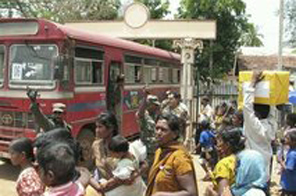SLanka holds polls in northern towns
COLOMBO: Sri Lanka hailed elections Saturday near an area once dominated by the Tamil Tiger rebels as the first seeds of democracy sprouting along the former battlefields of its recently ended civil war.
But opposition parties accused the ruling coalition of restricting their campaigns, the government barred most media from the region, and voters appeared apathetic to the first elections in the northern cities of Vavuniya and Jaffna since 1998.
The cities, where Tamils are a majority, are just outside the shadow state the Tamil Tigers ran as a virtual dictatorship and were frequently hit by violence during the quarter-century civil war.
The government recaptured the territory and routed the rebels on the battlefield in May, ending a conflict that killed between 80,000 and 100,000 people. The rebels were fighting for a separate state for minority Tamils after decades of marginalization by governments dominated by the Sinhalese majority.
"This is another step toward strengthening democracy in the north," said Douglas Devananda, a government minister from Jaffna. Devananda's Tamil party — with its armed paramilitary wing — is leading the ruling coalition's election slate in Jaffna.
Polls opened Saturday at 7 a.m. (0130 GMT) with 125,043 eligible voters set to elect 34 members to municipal councils in the two cities.
Six political parties and independent groups fielded 174 candidates for Jaffna, while 135 politicians from nine parties contested seats in Vavuniya. Results were expected Sunday.
The government was also holding an election in Uva province to the south and was likely to get a boost from the recent capture of the rebels' new leader, Selvarasa Pathmanathan.
Pathmanathan, the Liberation Tigers of Tamil Eelam's former chief weapons smuggler, was arrested in Southeast Asia and sent back to Sri Lanka, where he was being questioned, the government said Friday.
Sri Lankan defense spokesman Keheliya Rambukwella said the arrest showed "that we are capable of demolishing any future emergence of the LTTE."
Despite the rebels' defeat, both Jaffna and Vavuniya remain surrounded by government checkpoints and are accessible only with written permission from the Defense Ministry. Even residents can't leave without permission.
The main opposition United National Party said its lawmakers had to obtain permission to enter the cities for campaigning.
The government has refused permission for reporters to cover the elections — though ruling party dignitaries brought reporters on their campaign trips — saying journalists will have to rely on official statements for their coverage.
Paris-based Reporters Without Borders said the decision to bar the media "dashes any hope of a transparent election."
Nearly 300,000 Tamil civilians who fled the war zone during the final months of fighting also are being held in camps near the two cities.
Suresh Premachandran, a lawmaker from the Tamil National Alliance — seen as a front for the rebels — said the elections were just a government show.
"The Tamil people do not want an election at this time when hundreds of thousands of their relatives are held in government camps," he said.
Veerasingham Anandasangaree, a veteran politician who leads the Tamil United Liberation Front, accused the ruling coalition of misusing state resources in the campaign. "Every day a minister comes here and gives various promises. One minister promises jobs and another pledges to build a stadium," he said.
Devananda dismissed the complaints, saying the opposition was just preparing excuses if they lose.
Though the campaign was relatively peaceful, few people seemed engaged, said Keerthi Tennakoon, the national organizer of the Campaign for Free and Fair Elections.
A poll taken late last month by the Center for Policy Alternatives, a public policy group, showed that 67 percent of eligible voters in Jaffna were either undecided or refused to say for whom they would vote.
"They are not showing any enthusiasm for the elections," Tennakoon said.






